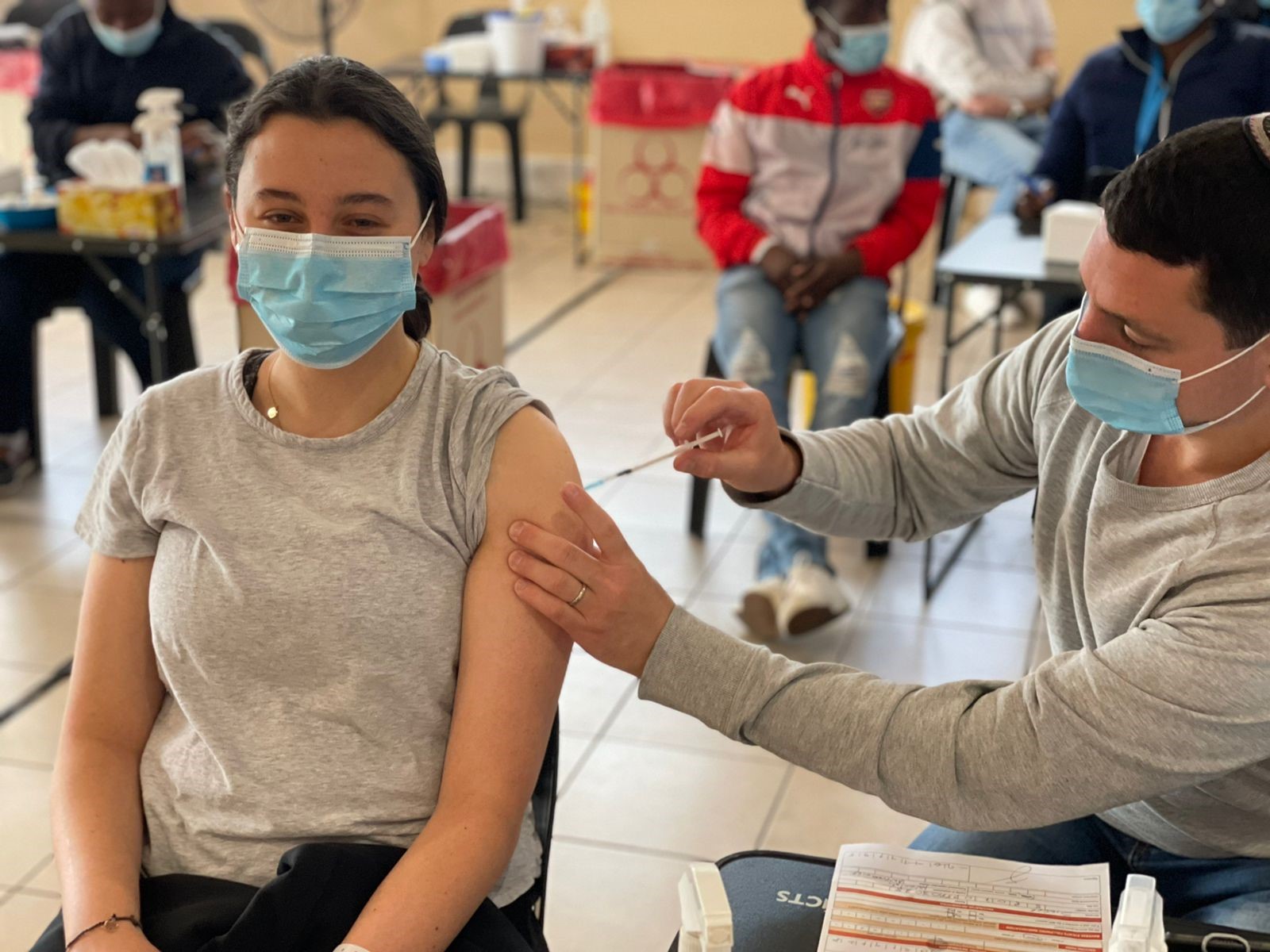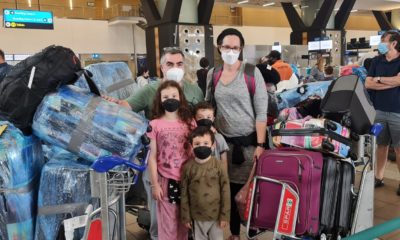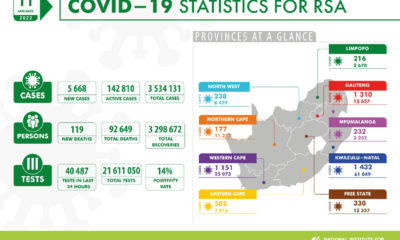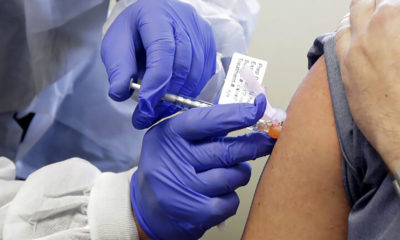
News

Community urged to be cautious as wave gathers speed
The Omicron variant is hitting the Johannesburg and Cape Town Jewish communities, with numbers rising rapidly but very few hospitalisations. Those hospitalised – at this point – are mainly unvaccinated.
However, many organisations have taken precautions to stem the tide to avoid a repeat – or worse – of what happened before. The machanot and Rage festival were this week cancelled, among many other private simchas.
The number of new infections in the community have increased rapidly over the past two weeks, says Darren Kahn, the executive general manager of Hatzolah Medical Rescue. There have been 272 new cases recorded this week, with 387 active cases in the community.
“To date, thankfully, there has only been one hospitalisation and we have two long-term patients on oxygen from the third wave,” he says.
“The current numbers are fast approaching our original planned numbers, and the wave is just beginning. The Hatzolah team is working around the clock to ensure the community is well cared for.”
Though Kahn said responders were fearful of a return to the COVID-19-positive numbers experienced only a few months ago, many experts believe this variant will be far milder than any we have had before if you have been vaccinated.
“We all enjoyed a couple of COVID-19-free months, but it’s unfortunately time to start being more careful again. We urge the community to go back to the basics: get vaccinated, wear a mask, keep a social distance, and sanitise. Let’s do this and get through the next wave together.”
To date, Hatzolah has vaccinated more than 30 000 people at its vaccination site.
In Cape Town, the South African Jewish Board of Deputies and Community Security Organisation (CSO) sent out an alert to the community on the morning of Wednesday, 1 December, with the subject line: “COVID-19 warning: fourth wave is on our doorstep!”
“CSO Cape Town has seen active cases on its COVID-19 Wellness Monitoring Programme surge from 0 on Friday, 26 November, to 28 cases on Tuesday, 30 November. While little is known about this new variant, we do know that its reproductive rate is at the same level as it was at the peak of the previous waves.”
After meeting medical advisors, Chief Rabbi Dr Warren Goldstein says shuls’ safety protocols haven’t changed. “This is rather just a call to reinforce what we have done so well since the beginning of the pandemic,” he said. “The message we need to communicate to our community is that there’s no need to panic and that, working together, our shuls will be safe places for them to attend, even at this time.”
Meanwhile, the Ballito Matric Rage festival was cancelled after one day, when 32 attendees and four staff members tested positive for COVID-19.
But Ronen Klugman, the founder and director of Plett Rage, says that the festival will go ahead from 3 to 7 December, with about 900 people attending. “We’re not cancelling because we’re the last line of defence against this disaster of the new variant. Kids are already arriving – I can see them on the beach – and if we cancel, it will make the situation much worse. They will scatter, and spread all over this town, and there will be no control,” he told the SA Jewish Report.
But with the festival in place, “The only way they can get into events is if they go through our testing centre. We have the responsibility to stick to our robust plan. Everyone is vaccinated, so that’s our first buffer. They have to take a PCR test before they leave. They present their vaccine certificate and PCR test on arrival. Then they go for a rapid antigen test. They get an AR band with a chip that only works for one day. Then they get tested again. If anyone tests positive, we implement contact tracing and take any contacts out of the festival.”
Local virology expert Professor Barry Schoub told Sky News, “All the cases [of the new Omicron variant] so far have been mild to moderate cases, and that’s a good sign.”
Dr Efraim Kramer, a leading international expert in emergency medicine with a specialty in mass gatherings, told the SA Jewish Report, “At the moment, we’re still groping [for information about the new variant] because tests are being done in a laboratory. We’ll find out in the next one to two weeks exactly what its transmissibility is and what kind of clinical profile it has.”
Dr Carron Zinman, a pulmonologist at Netcare Linksfield Hospital, told the SA Jewish Report that there had been differences in the symptoms of people who had presented with the new variant.
“They are saying it’s presenting atypically. In general, people are complaining of loss of taste or loss of smell. The GPs are seeing a lot of extreme fatigue with nothing else. In terms of my patients in hospital, one came in with something unrelated, not knowing she had it. So, it’s behaving differently, and the bloods are looking different as well.”
Zinman believes the Omicron variant is the reason for most of the positive tests at the moment, and thinks the new variant is more contagious.
Kramer agrees with President Cyril Ramaphosa, who said on Sunday that South Africans need to learn to live with the virus. “The days of trying to run away from it, trying to evade it, being in lockdown, and those kinds of things are gone,” Kramer says. “It’s here almost to stay, and every time we think it’s gone away, another cousin arrives.
“I don’t think there’s anything mysterious anymore about COVID-19. The president said we were staying at level 1. His statement was exceptionally positive in what he said, and exceptionally positive in what he didn’t say, if you read between the lines. In the meantime, we’ve kept the country on level 1, so we carry on.”
Kramer encourages people to go to shul. “There hasn’t been a single COVID-19 case in 20 months in people going to shul. Probably 99% of the people coming to shul are vaccinated,” he says.
If people want to go on holiday, they can as long as they take COVID-19 into consideration in everything they do, Kramer says. “The only mandatory aspect of that lifestyle is that people must get vaccinated so that if you do get it, you don’t get it severely. Our community is highly compliant in terms of COVID-19 vaccination. That’s fantastic as it means that life can almost carry on for them.
“If they want to go on holiday, they must go on holiday. If they want to get married, they must get married. We can’t knock people around anymore. We’re going to have a generation of dysfunctional kids if we carry on this way. People must do what they want to, they must just be careful.”
Kramer has criticised the “political panic” around Omicron, saying, “They believe that by closing doors, they’re going to keep it out. What they don’t know is that it’s there already. They just don’t know who’s got it, how many have got it, and how quickly it’s going to spread.”
“Closing borders doesn’t make scientific sense,” Schoub told Bloomberg TV. “What we have to recognise is this measure is politically motivated, which is highly damaging to countries like South Africa that depend on the tourist industry.”
Kramer says unvaccinated people shouldn’t be named and shamed. “We don’t know why people haven’t been vaccinated. It could be because they choose not to, because they’re scared to have it. It could be that they’re allergic to the preservative in the vaccination and they’re not allowed to have it because they’ve been anaphylactic before.” But he warns, “The people that are landing up in intensive care are the ones that aren’t vaccinated.”
Asked if the vaccines we have protect us from the new variant, Zinman says, “All of that needs to be worked out. I think that you have to accept that there’s got to be some protection from the vaccine, because the vaccines to date have shown efficacy against all the variants.”










